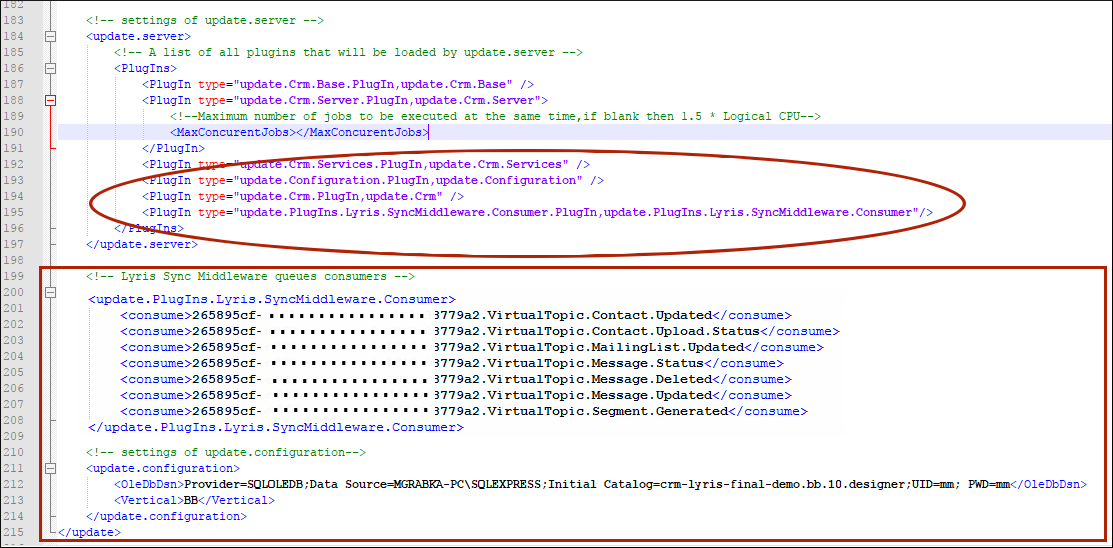ACM Sync Middleware Overview
CRM.Server has a plugin for the ACM Sync Middleware that allows it to listen to event notifications posted on the event queues hosted by the ACM Sync Middleware.
The Sync Middleware URI and the authentication details are configured in the following web
configuration parameters in the designer: Lyris.SyncMiddlewareUri;
Lyris.SyncMiddlewareUsername; and
Lyris.SyncMiddlewarePassword. For more information on these parameters,
see Lyris Parameters.
The ACM Sync Middleware uses the Java Messaging System to publish event messages. You can
configure multiple instances of CRM.Server to listen to one or more event queues. There are
8 event queues maintained by the ACM Sync Middleware. The event queues handled by the
CRM.Server instance is configured using the
<update.PlugIns.Lyris.SyncMiddleware.Consumer> element in the
settings.server.xml file for the CRM.Server instance. The
<consume> child node contains the name of the event queue the
CRM.Server instance listens to.
The event queue name should have the following format:
<ORGANISATION UID>.VirtualTopic.<EVENT NAME>
Organization UID has the value 26589cf-...
-377pa2. To get the <Organization UID> for your organization, see Ordering Access to the ACM SyncMiddleware.<consume>vm0000a88a.VirtualTopic.Contact.Updated</consume>The following event names are supported:
- Contact.Updated—for example,
Consumer.Lyris_EndPoint.VirtualTopic.Contact.Updated. - Contact.Upload.Status—for example,
Consumer.Lyris_EndPoint.VirtualTopic.Contact.Upload.Status. - MailingList.Updated—for example,
Consumer.Lyris_EndPoint.VirtualTopic.MailingList.Updated. - Message.Status—for example,
Consumer.Lyris_EndPoint.VirtualTopic.Message.Status. - Messge.Deleted—for example,
Consumer.Lyris_EndPoint.VirtualTopic.Message.Deleted. - Message.Updated—for example,
Consumer.Lyris_EndPoint.VirtualTopic.Message.Updated. - Segment.Generated—for example,
Consumer.Lyris_EndPoint.VirtualTopic.Segment.Generated.
The following configuration settings shows the CRM.Server instance listening to different message queues (in the red box).

Ordering Access to the ACM SyncMiddleware
You can place your request for the ACM SyncMiddleWare details from https://support.aurea.com/. Ensure that you provide the Aurea support group with the following information:
- Your preferred Lyris Organization UID or proper Lyris HQ Organization name.
You should receive the following information from support on the ACM SyncMiddleware and Lyris API:
Organization UIDLyris.SyncMiddlewareUriLyris.SyncMiddlewareUsernameLyris.SyncMiddlewarePasswordLyris.HostLyris.APIPassword